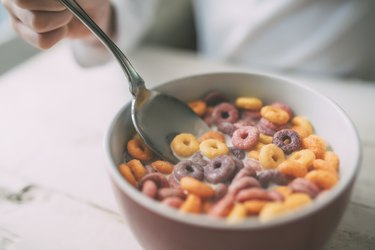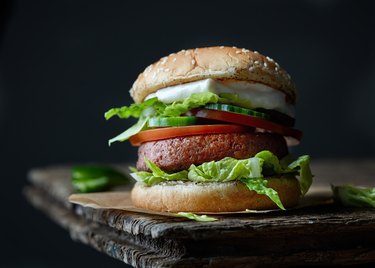
If you want to think sharp today — and continue to do so as you age — you've got to feed your brain the good stuff. You know, the whole foods-filled diet packed with plant-based fare, like the dark green leafy veggies, berries, nuts, olive oil, beans and omega-3-rich fish that make up the MIND diet, which has been shown to reduce the risk of cognitive decline and dementia.
But there are so many foods you might be eating regularly that don't serve your cognitive powers. By limiting them (or, yep, even eliminating them altogether), you can help give your noggin the edge and support your brain power. Here are five foods to rethink:
Video of the Day
Video of the Day
1. Commercial Baked Goods
Foods like store-bought doughnuts and croissants contain a trifecta of things that are bad for your cognitive health: "Commercial baked goods are often sources of trans fats, empty calories and added sugar," Drew Ramsey, MD, founder of the Brain Food Clinic and assistant clinical professor of psychiatry at Columbia University in New York City, tells LIVESTRONG.com. (They also tend to be oversized, providing a heftier dose of these things.)
This type of food — and the others on this list — are bad for brain health because they lead to inflammation. "These are foods that don't support a healthy gut microbiome, which is a major regulator of inflammation," Dr. Ramsey says. "When the brain is struggling with inflammation, it affects three circuits: Your mood, anxiety and ability to focus, or your cognitive capacity."
2. High-Glycemic-Index Foods

As a category, these consist mostly of highly processed foods (think: breakfast cereals and bars, packaged snacks and desserts, high-sugar dairy products). "Many individuals are following a very unhealthy dietary paradigm of counting calories, avoiding fat and revolving much of the diet around simple carbohydrates," Dr. Ramsey says.
High-GI foods spike blood sugar, and there is a correlation between high-GI diets and depression, especially in older women, he says, which is illustrated by research in The American Journal of Clinical Nutrition in August 2015. Depression has wide-ranging effects on quality of life, but it's also associated with cognitive decline with age, notes additional research in the Journal of Alzheimer's Disease in September 2021.
"The one simple way to focus on better blood sugar regulation is to increase the fiber in the foods you eat," Dr. Ramsey says. Eating more fruits and vegetables (especially crunchy ones) will help you up the fiber in your diet.
3. Alcohol
You probably know your mind isn't at its sharpest after a few drinks (even if you suddenly feel full of good ideas). Well, research backs that up. A September 2019 study in JAMA Network Open looked at more than 3,000 adults ages 72 and older and found that those with mild cognitive impairment who drank more than 14 alcoholic drinks a week were 72 percent more likely to progress to dementia than those who had less than one drink a week.
It's worth noting that some other studies have found light drinking to be cognitively protective over time, but the key seems to be in the amount. That's why the Centers for Disease Control and Prevention recommend people assigned male at birth limit themselves to two drinks per day and those assigned female at birth stick to no more than one drink a day.
4. Artificial Food Dye
Side eyes the candy bowl
"There's no evidence that foods that contain artificial food dyes are good for the brain, and there's some evidence that they're irritating to both the brain and the gut," Dr. Ramsey says.
The great thing about eating in a way that revolves around real, whole foods is that you avoid added dyes completely. And it's that type of eating pattern that is healthy for your brain.
Dr. Ramsey points to the SMILES trial, published in BMC Medicine in January 2017, which showed that when people with depression who ate an overall poor diet switched to a Mediterranean-style eating pattern, one-third went into full remission (compared to just 8 percent of the control group). "These individuals added in more fish and plants to their diet and decreased their processed food consumption by 21 servings per week," he says.
5. Faux Meat

One of the most significant modern-day foods that drags down mental health is faux meat, Dr. Ramsey says. While he notes that there isn't data to support that, he suspects that eating "plant-based meats encourages consumption of highly processed foods, but is mistaken as being good for the health of the person and the planet."
It is not a victory, he says, that fast-food restaurants serve these options, but rather, it misses the larger point. Which is? That you should focus your diet more on plant-based foods while allowing for small amounts of red meat.
Dr. Ramsey encourages that people modify their beef consumption to eat fewer burgers and steaks and more beef-and-veggie stews. "Almost all traditional diets include meat and seafood. This approach uses meat in a more traditional and appropriate way," he says.
If possible, prioritize grass-fed beef and stick to eating it one night a week, Dr. Ramsey recommends.
- Alzheimer’s & Dementia: “MIND not Mediterranean diet related to 12-year incidence of cognitive impairment in an Australian longitudinal cohort study”
- American Journal of Clinical Nutrition: “High glycemic index diet as a risk factor for depression: analyses from the Women’s Heath Initiative”
- Journal of Alzheimer’s Disease: “Depressive Symptoms Imputed Across the Life Course Are Associated with Cognitive Impairment and Cognitive Decline”
- BMC Medicine: “A randomized controlled trial of dietary improvement for adults with major depression (the ‘SMILES’ trial)”
- Centers for Disease Control and Prevention: "Dietary Guidelines for Alcohol"
- JAMA Network Open: "Alcohol Consumption and Risk of Dementia and Cognitive Decline Among Older Adults With or Without Mild Cognitive Impairment"
Is this an emergency? If you are experiencing serious medical symptoms, please see the National Library of Medicine’s list of signs you need emergency medical attention or call 911.


